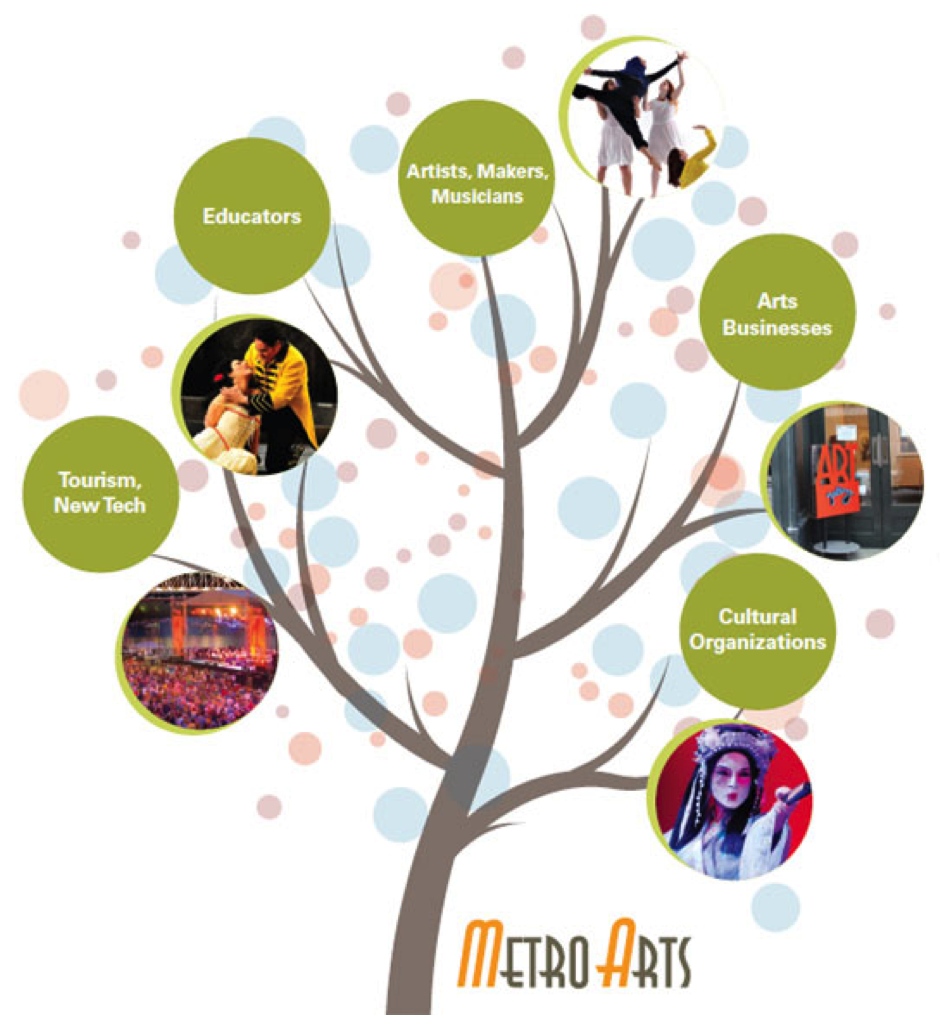Nashville Artisan Manufacturing Zone
OVERVIEW
The Metro Nashville Arts Commission (Metro Arts) functions as the arts and cultural division of the city of Nashville in Davidson County, Tennessee. In addition to facilitating the development of the arts, culture, and creativity section of the NashvilleNext Long-Range Plan, Metro Arts successfully championed the creation and adoption of an Artisan Manufacturing Zoning Amendment in August 2015.

CONTEXT
Metro Arts operates programs and engages in policy and planning initiatives that support the growth and development of arts, culture, and the creative community in the city-county region of Nashville and Davidson County, Tennessee. In 2014, Metro Arts was assigned to facilitate the community process to develop the arts, culture, and creativity section of the NashvilleNext long-range plan. The planning process generated many arts and culture planning priorities, including a policy goal to “create or streamline land use, zoning, and permitting tools to encourage the creation and enhancement of creative neighborhoods and cultural districts" (Nashville Next IV-19, 2015). One notable policy success championed by Metro Arts was the creation and adoption of an Artisan Manufacturing Zoning Amendment in August 2015.
Artists were facing constraints with finding suitable and affordable work and live/work spaces in the urban core due to limited availability in the context of gentrification and zoning barriers, with few spaces amenable to light manufacturing (such as the small batch production of textiles and other material goods as well as food). Artists reported encountering major restrictions with zoning in terms of where this type of manufacturing was permitted and the retail footprint allowable for these types of uses in existing mixed use, commercial and industrial areas. Zoning barriers included the fact that industrial areas did not include a mechanism for allowing some retail co-located with production space. These barriers existed in context of the fact that a significant portion of industrial land was identified as underutilized – land that could be suitable for small manufacturing and co-working space.
PARTNERS
MetroArts, Nashville-Davidson County Metro Planning Department, and the Metropolitan Planning Commission.
FUNDING
A majority of Metro Arts’ funding is from the city’s general operating fund; public art funding is generated from 1 percent of general obligation bonds which goes towards restoration or acquisition of public art. MetroArts also applies for grants from the NEA and national philanthropies. The NashvilleNext planning process was funded through
PROCESS
The need for this zoning amendment emerged from the dialogues that took place during the general planning process facilitated by Metro Arts. Artists voiced challenges with finding suitable and affordable work and live/work spaces in the urban core due to limited availability in the context of gentrification and zoning barriers, with few spaces amenable to light manufacturing (such as the small batch production of textiles and other material goods as well as food). Artists reported encountering major restrictions with zoning in terms of where this type of manufacturing was permitted and the retail footprint allowable for these types of uses in existing mixed use, commercial and industrial areas. Zoning barriers included the fact that industrial areas did not include a mechanism for allowing some retail co-located with production space. These barriers existed in context of the fact that a significant portion of industrial land was identified as underutilized ? land that could be suitable for small manufacturing and co-working space.
Following the adoption of NashvilleNext, Metro Arts worked closely with zoning staff to prepare an Artisan Manufacturing Zoning Amendment, which was subsequently adopted by the Metropolitan Planning Commission.
SUCCESS
The Artisan Manufacturing Zoning Amendment created clearer categories for arts and culture-related uses and removed some barriers and special permit requirements for artisan and small micro businesses. The adopted Amendment included:
- the creation of a new use definitions for Artisan Manufacturing and allowing this use with conditions in most mixed-use, commercial, and industrial zoned areas of Nashville Davidson County;
- the clarification of existing definitions for Rehearsal Hall, Theatre, Commercial Amusement (indoor), and Cultural Center and designation as allowable with conditions within artisan manufacturing;
- new allowances for parking for arts uses within Artisan Manufacturing; and
- new allowances for multi-family live/work housing within Artisan Manufacturing, i.e., a maximum of two live/work units on the same industrial parcel with exceptions around storage to protect health and safety.
Metro Arts’ success with the planning process and the zoning amendment are just two examples of their ongoing work to strengthen conditions in the city and county that can help the arts and culture community thrive. There were several conditions that were crucial to Metro Arts’ ongoing work with other government departments: the competencies of the arts team in acting as educators and translators to government staff in other departments and to artists in the community, and the willingness of the planning and zoning administrator and staff in other departments to proactively reach out to Metro Arts for advice and education on emerging arts uses.
Metro Arts often acts as internal consultants to colleagues in other departments that seek expertise on arts and culture. The Metro Arts staff team that understands terminology in the arts and planning fields and is able to act as educators and translators to increase the knowledge base of zoning staff and to help artists articulate their needs to government and to navigate the permitting process. Metro Arts is called upon to provide expertise on needs as diverse as: basic education on arts and culture industries; the facilities needs of certain types of arts uses; emerging issues, such as considerations for approving major art installations on private property and the inclusion of art on wayfinding signage in the downtown.
LEARN MORE
The NashvilleNext Plan. Metro Government of Nashville and Davidson County, Tennessee. (2015) http://www.nashville.gov/Government/NashvilleNext/The-NashvilleNext-Plan.aspx
ORDINANCE NO. BL2015-1121: An ordinance to amend various sections of Title 17 of the Metropolitan Zoning Code related to artisan manufacturing and associated uses. Proposal No. 2015Z-009TX-001. Nashville and Davidson County Metropolitan Code. (2015) http://www.nashville.gov/mc/ordinances/term_2011_2015/bl2015_1121.pdf
The Metro Nashville Arts Commission. (2016) http://www.nashville.gov/Arts-Commission.aspx